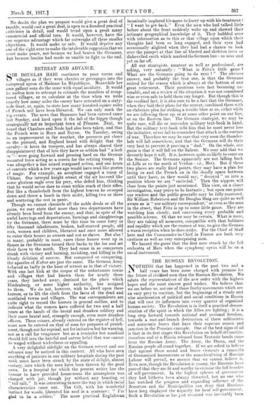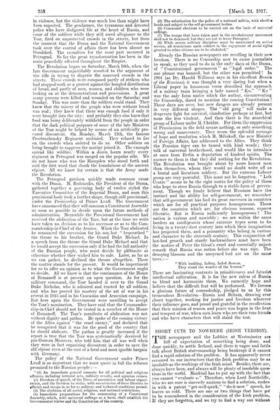THE - RUSSIAN REVOLUTION. N OTHING that has happened in the past
two and a half years has been more charged with promise for the future of civilized men than the Russian Revolution. We salute the representatives of the new order with the highest hopes and the most sincere good wishes. We believe that we see before us, not one of those frothy movements which are an easy prey to reaction, but the beginnings of a steady and wise amelioration of political and social conditions in Russia that will cast its influences into every quarter of organized human society. The Revolution is in itself a practical demon- stration of the spirit in which the Allies are fighting ; it is a long step forward towards national and personal freedom, towards a root-and-branch destruction of those militaristic and autocratic forces that have their supreme source and sanction in the Prussian example. One of the best signs of all is that in its first stages this Revolution on behalf of Constitu- tionalism and of a Russia released from Teutonic bonds came from the Russian Army. The Army, the Dams, and the Russian people all stand together. If we are asked to believe that against these sound and bravo elements a canmrilla of Germanized bureaucrats or the anarchical wing of Russian Labour will prevail, we answer that we cannot believe it. Even now, though the Revolution is young, the Russians have proved that they are fit and worthy to exercise the full benefita of self-government. In the highest spheres of government they had hitherto been always thwarted, but no one who has watched the progress and expanding influence of the Zemstvos and the Municipalities can deny that Russians have long displayed the capacity for local self-government. Such a Revolution as has just occurred was inevitably born in violence, but the violence was much less than might have been expected. The gendarmes, the tyrannous and detested police who have disfigured life at the heart of Russia, and some of the soldiers while they still owed allegiance to the Tsar, fired on unprotected crowds in the streets, but from the moment that the Duma and the National Government took over the control of affairs there has been almost no bloodshed. The casualties for the most part occurred in Petrograd. So far the great transformation has been in the main peacefully effected throughout the Empire.
The Revolution began on Saturday, March 10th, when the late Government unjustifiably resorted to the argument of the rifle in trying to disperse the unarmed crowds in the streets. These crowds were composed partly of strikers who had stopped work as a protest against the bungled distribution of bread, and partly of men, women, and children who were looking on at the demonstrations and processions. A great many persons were killed and wounded on the Saturday and Sunday. This was snore than the soldiers could stand. They knew that the misery of the people who were without bread was real ; they knew that there was enough food if only it were brought into the city; and probably they also knew that food was being deliberately withheld from the people in order that the dark political purposes of some of the late Ministers of the Tsar might be helped by means of an artificially pro- cured discontent. On Monday, March 12th, the famous Preobrazhensky Regiment mutinied. They refused to fire on the crowds when ordered to do so. Other soldiers on being brought to suppress the mutiny joined it. The example spread like wildfire. Within a dozen hours nearly every regiment in Petrograd was ranged on the popular side. We do not know who was the Hampden who stood forth and said the first word that shook the foundations of the ancient regime. All we know for certain is that the Army made the Revolution.
The Petrograd garrison quickly made common cause with the Duma. M. Rodzianko, the President of the Duma, gathered together a governing body of twelve styled the Executive Committee of the Imperial Duma, and soon this provisional body took a further shape, though still provisional, under the Premiership of Prince Lvoff. The Government have announced that they will summon a Constituent Assembly as soon as possible to decide upon the futUre methods of administration. Meanwhile the Provisional Government had received the abdication of the Tsar, but at the time we write have taken no decision as to his successor or as to the Com- mandership-in-Chief of the Armies. When the Tsar abdicated lie renounced the succession for his son, but " bequeathed " the throne to his brother, the Grand Duke Michael. In a speech from the throne the Grand Duke Michael said that he would accept the succession only if he had the full authority of the Russian people, who must decide by plebiscite or otherwise whether they wished him to rule. Later, so far as we can gather, he declined the throne altogether. There the matter stands for the present. It would be impertinent for us to offer an opinion as to what the Government ought to decide. All we know is that the continuance of the House of Romanoff is at present an open question. As for the military command, the Tsar handed it over to the Grand Duke Nicholas, who is admired and trusted by all soldiers, and who has proved his mastery of the art of war in his retreat in 1915 and in his Caucasian and Armenian campaign. But here again the Government were unwilling to accept the Tsar's nomination. They have said that the Commander- ship-in-Chief should not be vested in a member of the House of Romanoff. The Tsar's manifesto of abdication was not without dignity and pathos. lie spoke of the coming victory of the Allies against " the cruel enemy," and declared that he recognized that it was for the good of the country that lie should abdicate. The pathos is greatly increased if the report is true that the Tsar was systematically deceived by pro-German Ministers, who told him that all was well when they were in fact organizing discontent in order to save the old regime even at the cost of a fatal and most ignoble bargain with Germany.
The policy of the National Government under Prince Lvoff is so important that we must quote in full the reforms promised to the Russian people :— " (1) An immediate general amnesty for all political and religious offences, including terrorist acts, military revolts, and agrarian crimes.
(2) Freedom of speech, of the Press, of association and labour organi- zation, and the freedom to strike, with an extension of these liberties to officials and troops in so far as military and te,ebnical conditions permit. (3) The abolition of all social, religious, and national restrictions.
(4) Immediate preparations for the summoning of a Constituent Assembly, which, with universal suffrage as a basis, shall establish the Governmental realm and the Constitution of the country.
(5) The substitution for the police of a national militia, with elective heads and subject to the self-government bodies. (6) Communal elections to be carried out on the basis of universal suffrage. • (7) The troops that have taken part in the revolutionary movement shall not be disarmed, but they aro not to leave Petrograd_ (8) While severe military discipline must be maintained on active service, all restrictions upon soldiers in the enjoyment of social rights granted to other citizens are to be abolished."
Already the Russian newspapers are revelling in their new freedom. There is no Censorship now to cause journalists to speak, as they used to do in the early days of the Duma, of " Constitutional government " as " legal order." The one phrase was banned, but the other was permitted ! In 1904 (as Dr. Harold Williams says in his excellent Russia of the Russians) it was thought a very daring feat when a Liberal paper in humorous verse described the approach of a railway train bringing a lady named " Ko." Igo " was the only form under which the author, circumventing the Censorship, dared to mention the coming Constitution Those days are over, but new dangers are already present in very -different shapes. The " old gang " will make a desperate fight for survival, clandestine perhaps at first, but none the less virulent. And then there is the anarchical group of Labour under M. Cheidze. For them the suppression of Prussianism in the field means nothing, or only something wrong and unnecessary. They scorn the splendid message of hope and resolution which M. Miliukoff, the new Minister of Foreign Affairs, has addressed to the Allies. They think the Prussian tiger can be tamed with kind words ; they talk of universal brotherhood, and would like to introduce at once from Berlin a deputation of kindred spirits. The answer to them is that they did nothing for the Revolution. The Revolution was brought about by more honest men than themselves, whom they would no doubt write off as a brutal and licentious soldiery. But the extreme Labour group are very powerful., This must not be forgotten. " Left Centre " seems to be the right motto for the policy of those who hope to steer Russia through to a stable form of govern- ment. Though we firmly believe that Russians have the instinct and the ability for self-government, we remember that self-government has had its great successes in countries which are for all practical purposes homogeneous. Those are the countries which are, for obvious reasons, capaces libertatis. But is Russia sufficiently homogeneous ? The nation is various and unwieldy ; we see within the same borders an intelligentsia whose extreme types seem to be living in a twenty-first century into which their imagination has projected them, and a peasantry who belong in custom and character to the sixteenth century. This conjunction of hot-bed growth and sturdy backwardness must have been the motive of Peter the Great's cruel and essentially unjust remark that Russia was rotten before she was ripe. The drooping blossom and the unopened bud are on the same trees :—
"with budding, fading, faded flowers, They stand the wonder of the bpwers."
There are fascinating contrasts in primitiveness and futurist intellectual cultivation. It is for the new rulers of Russia to blend and harmonize them. We earnestly hope and believe that the difficult feat will be performed. We foresee a glorious future of comradeship, pledged to us by this tremendous Revolution—Russia and Britain, drawing ever closer together, working for justice and freedom wherever their influence goes, and proud and grateful in the recollection that their mission of reason and peace was begun in the heat and tempest of war, when men learn who are their true friends and who have characters that will stand the test.



























 Previous page
Previous page